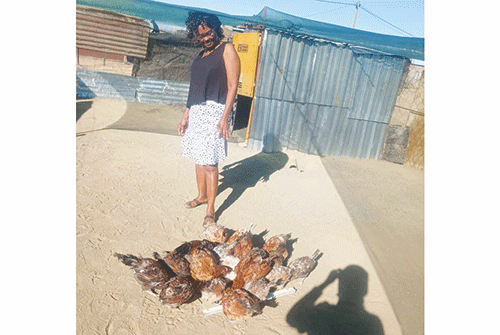The International Trade Administration Commission, which is the de facto trade regulator for the SACU market has concluded a preliminary investigation of dumping of poultry products into SACU.
Technical advisor at the Namibian Agricultural Trade Forum (ATF) Maria Immanuel said after considering all interested parties’ submissions and comments, ITAC made a preliminary determination that the subject product originating in or imported from Brazil, Denmark, Ireland, Poland and Spain are being dumped into the SACU market, causing a material injury and a threat of material injury to the SACU poultry industry.
“As a result, ITAC requested the relevant authorities to impose provisional measures (anti-dumping measures) on imports of the subject products for a period of six months. The South African Revenue Services (SARS) has gazetted the measure on 4 March 2022, to be implemented with retrospective effect from 17 December 2021 up to and including 14 June 2022,” stated Immanuel.
SARS, by implication, also manages the implementation of the SACU’s customs tariff system.
In trade terms, dumping occurs when the exporting country sells the subject product in SACU at prices less than the normal value in the countries of origin. An anti-dumping action is normally initiated by the domestic producers through a submission of application to ITAC.
Immanuel alleged that because of the dumping of the subject product from those countries, the SACU industry was experiencing material injury in the form of price undercutting, price depression during the 2017/18 – 2018/19 period, price suppression, the decline in profit, decline in return on investment, decline in capacity and capacity utilisation and increase in inventory.
Touching on the implications for Namibia, she noted it is evident from the ITAC detailed report that it was only the South African poultry producers (eight of them) who initiated the investigation by lodging an application with ITAC on behalf of the SACU market.
“ITAC’s procedures only require that a substantive portion of the domestic industry or market be affected for it to act. The South African poultry sector is deemed sufficiently large to meet this requirement on its own without the need for poultry industries in other countries in SACU to be taken into account,” explained Immanuel.
Whether Namibia and other SACU members (Botswana, Lesotho, Eswatini) participate or not, the outcome and its implementation directly affects all SACU members since SACU has a common external tariff, making it a common customs territory or in simple terms, one market.
She noted importers in Namibia would have to pay the applicable anti-dumping duties when importing from those countries, while domestic producers will also benefit from the protection provided by the additional duties.
Lessons for Namibia in this situation, is that the country should prioritise institutionalising her own trade regulator body to align implementation of the SACU agreement and other trade agreements in place and those yet to be gazetted for implementation such as the African Continental Free Trade Agreement (AfCFTA).
A trade regulator body will allow Namibia to set up and build capacity in trade remedy matters which include trade investigations for dumping and countervailing measures (a surge of imports upon opening the domestic market to products under a trade agreement), as well as coordinate tariff setting and implementation issues, as well as determination of rebates, with ITAC.
Immanuel added that the body will balance private sector support within the customs union to maximise the benefit of the SACU agreement and other international trade agreements already in place.



